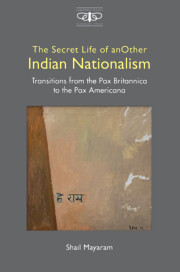 The Secret Life of AnOther Indian Nationalism
The Secret Life of AnOther Indian Nationalism Book contents
- Frontmatter
- Dedication
- Contents
- List of Figures
- List of Abbreviations
- Preface
- Acknowledgements
- Note on Transliteration
- 1 Introduction: Colonialism, Orientalism, Nationalism and the Shaping of Popular History and Religion
- 2 Orienting the Vernacular Imaginaire: James Tod and Indian Nationalism
- 3 War and Violence in Savarkar’s View of Indian History
- 4 Nationalism and Time: The Vishva Hindu Parishad’s Fantasmagorical History
- 5 Transforming Hinduism: The Politics of Vishva Hindu Parishad Conversion
- 6 AnOther History of Religion
- 7 Sushila Rawat, the Healer of Husain Tekri: Myth and Medical Pluralism as Resistance to Hindutva
- Index
7 - Sushila Rawat, the Healer of Husain Tekri: Myth and Medical Pluralism as Resistance to Hindutva
Published online by Cambridge University Press: 11 February 2022
- Frontmatter
- Dedication
- Contents
- List of Figures
- List of Abbreviations
- Preface
- Acknowledgements
- Note on Transliteration
- 1 Introduction: Colonialism, Orientalism, Nationalism and the Shaping of Popular History and Religion
- 2 Orienting the Vernacular Imaginaire: James Tod and Indian Nationalism
- 3 War and Violence in Savarkar’s View of Indian History
- 4 Nationalism and Time: The Vishva Hindu Parishad’s Fantasmagorical History
- 5 Transforming Hinduism: The Politics of Vishva Hindu Parishad Conversion
- 6 AnOther History of Religion
- 7 Sushila Rawat, the Healer of Husain Tekri: Myth and Medical Pluralism as Resistance to Hindutva
- Index
Summary
Even as Hindutva garners support through popular history and the modern idea of religion, it encounters its fiercest opposition from another religious language—that of spirit possession. Hindutva activists dismiss ideas relating to spirits as ‘superstition’. But among both Hindus and Muslims are beliefs and practices relating to spirits as inhabiting the cosmos and porous bodies. These constitute shared mythic spaces and, as I have argued elsewhere, are the basis of living together amid conflict, a humbler translation of cosmopolitanism. Sushila Rawat, healer of Husain Tekri, represents a larger phenomenon involving both multiple shamanisms and also medical pluralism.
Strangely enough Sudhir Kakar identified a Hindu–Muslim divide in the discourse of possession and argued that a Hindu is usually possessed by a Muslim bhūt, or malignant spirit. This is ironic as it was his seminal work on India's healing traditions that brought out diverse meanings and expressions of possession and exorcism. Kakar writes:
Possession by a Muslim bhuta, then, seemed to reflect the afflicted person's desperate efforts to convince himself and others that his hunger for forbidden foods and uncontrolled rage towards those who should be loved and respected, as well as all other imagined transgressions and sins of the heart, belonged to the Muslim destroyer of taboos and were furthest away from his ‘good’ Hindu self. In that Muslim bhutas were universally considered to be the strongest, vilest, the most malignant and the most stubborn of the evil spirits, the Muslim seemed to symbolize the alien and the demonic in the unconscious part of the Hindu mind.
In one of Kakar's case studies, a Brahman priest demanded to eat kababs during his trance. Kakar grants these the status of preconscious attitudes of Hindus towards Muslims. The communal imagination is well entrenched in childhood, he argues, although the drives continue to be suppressed. ‘Bhutna seems less an individual childhood anxiety than a collective fear of Indian Muslims.’
For me the following questions were salient. Are Hindus possessed predominantly by Muslim spirits? Do Hindu women betray sexual anxieties with respect to Muslim men? Does the discourse of spirit possession and exorcism suggest the otherness of the Muslim for the Hindu?
- Type
- Chapter
- Information
- The Secret Life of AnOther Indian NationalismTransitions from the Pax Britannica to the Pax Americana, pp. 227 - 264Publisher: Cambridge University PressPrint publication year: 2022


